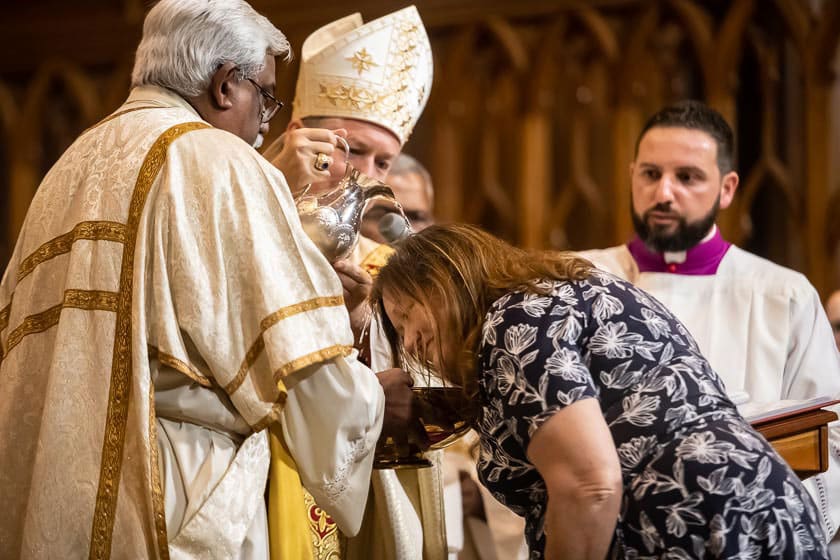
This is the homily given by Archbishop Anthony Fisher OP at the Solemn Mass for the 12th Sunday in Ordinary Time Year A, St Mary’s Cathedral, Sydney, 25 June 2023.
Evoking Charles Dickens’ archenemy of Christmas, Ebenezer Scrooge, the economist Joel Waldfogel has written Scroogenomics: Why You Shouldn’t Buy Presents for the Holidays. He invites us to consider that “rooster sweater from Grandma or the singing fish from Uncle Mike” that we’ve received, and asks how many of us get gifts we don’t really want and do the same to others? He calls this “deadweight loss”: purchases that cost the givers more than they are worth to the recipients, and that leave both sides dissatisfied. Waldfogel’s isn’t a Scrooge-like misanthropy, or an idealist’s anti-materialism, but an accountant’s abhorrence of inefficiency. He argues that people in consumer economies waste trillions of wealth and billions of shopping hours on gifts that almost inevitably miss the mark—dollars and energies that would be better deployed elsewhere.
Not everyone agrees. Anthropologists say gift-giving is a near-universal practice that fosters human connection and kindness, appreciation and trust. People give things to each other to mark occasions, make alliances, reward performance, signal affection, or assist those in need. The symbolic power comes from its being a free gift from and even of a person to another, and from what that says about their mutual regard for each other. Gifts have their place in many religious traditions also.
St Paul, for instance, clearly loved presents. He longed to be with his people so he could “exchange gifts” with them (e.g. Rom 1:11; 1 Cor 1:7). He popularised the name “Grace” or “Gift” for God and God’s actions. He quoted Christ as saying it’s more blessed to give than to receive (Acts 20:35) and counselled gratitude. He charged us with being generous with the Sunday collection for the clergy, widows and poor, for “God loves a cheerful giver” (2 Cor 9:7).
Indeed, from Genesis onwards, the God of the Bible is the Creator and Giver of all good gifts, including our existence, nature and opportunities. He gave us His Son to be our salvation, and we meet Him still in word and sacrament—including that Eucharistic Body that five of our sons will receive today for the first time. He also sent “the Holy Spirit, the Lord, the Giver of life” both earthly or eternal, and the Giver of other spiritual gifts, such as wisdom, healing, consolation and community.
Though God is the guy who literally has everything, the Scriptures suggest that we can and should give back to God, in sacrifice and worship, praise and thanksgiving. Jesus is mightily impressed by a poor widow giving God and the poor her mite at the Temple (Mk 12:41-44). Kings venerate Him with gifts at His birth, crowds do so with blossoms, cloaks and Hosannas as He enters Jerusalem, and a woman anoints Him with precious ointment before His Passion (Mt 2:11; 21:7-9; 26:6-13).
Yet if gifts can be freely given, they can also be freely rejected. Ever since our first parents gave God the proverbial “thanks but no thanks,” humanity has wrestled with the effects of sin and separation from God. Today’s prophecy tells of the resulting sense of terror and betrayal (Jer 20:10-13). Today’s psalm, of taunts and alienation (Ps 68(69)). Today’s epistle laments the lawlessness within us sin exposes (Rom 5:12-15). And today’s Gospel, the spiritual death that is so much worse than physical destruction, the anxieties that eat us up, the cowardice that disowns Christ (Mt 10:26-33). Such sin is writ large in the warfare in Ukraine at present; in the violence that terrorises some domestic settings; in the state-sanctioned killing of our youngest and oldest; and in the callous disregard of the voiceless and forgotten. God gives us exactly what we most need, and all too often we Scrooge-like return His gifts unopened.
What a slap in the face to the Giver of all good gifts! If we call thanksgiving for food “grace”, this ingratitude is surely “dis-grace”. Yet in the Easter proclamation we dared to sing of our greatest sin as, “O truly necessary sin of Adam, destroyed completely by the death of Christ! O happy fault, that earned for us so great, so glorious a Redeemer!” In response to sin’s separation, we have God’s gift of a “beautiful reparation”. It’s a love so total and personal that, as Jesus puts it today, it knows every hair on our heads (Mt 10:26-33) or, for the bald amongst us, read: knows every cell of our bodies, every breath, thought, feeling and aspiration!
In today’s epistle Paul, like the Exultet, recalls that despite all the rejection notices humanity has sent Him, the cosmic Gift-giver gave His only Son, to repeat His offer of communion. Not just turning a blind eye to our faults: this is God healing, elevating, divinising, making something even better of us than we were before our fall. “If many died through the sin of that one man, Adam,” Paul says today, “much more surely were many saved though the abundant free gift of that one man, Jesus Christ.” (Rom 5:12-15) And so in this Mass and always, we thrill with Paul: “Thanks be to God for His indescribable gift!” (2 Cor 9:15)
